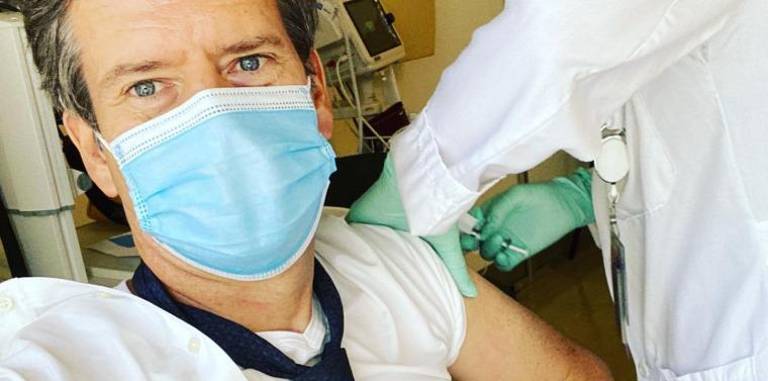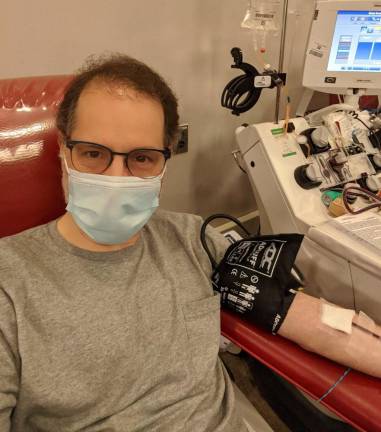State Senator Brad Hoylman felt it was “truly a matter of putting my money where my mouth is.” Well, actually, where his arm is. That is where Hoylman last week received the second of two injections as part of his participation in a large trial to test whether a proposed vaccine will prevent infection by the coronavirus.
Hoylman, a Greenwich Village Democrat and, as of August 20, one of at least five candidates for Manhattan borough president, has been a leading advocate in the legislature for vaccines as necessary public health measures. He consulted Anthony Fauci among others in drafting legislation last year that tightened requirements for kids to get a measles vaccine after a series of scary outbreaks.
Far from receiving the thanks of a grateful community, Hoylman drew angry and sometimes threatening ripostes. “Vaccine skepticism is real,” he said, “as I personally know, given the vitriol my family and I received.”
But nothing Hoylman went through over the measles vaccine compares to the challenge the entire world is about to face, and he knows it. Participating in the vaccine trial “is something I think we can do in terms of our civic participation to try to beat this virus.”
President Trump in his convention speech last week promised a vaccine against coronavirus would be available by the end of this year. That could turn out to be true. Or not. Trump has no way to know, because no one knows for sure.
No vaccine has yet been proven effective and approved by regulators for general use anywhere, although the Russians and the Chinese have put vaccines into use while trials are continuing.
There is plenty of optimism. But at a moment when New Yorkers, and much of the rest of the world, are counting on a vaccine to end the COVID-19 nightmare, optimism is not a substitute for scientific proof.
Nine vaccine candidates, including the one Hoylman had jabbed in his arm the other day, are currently in what are known as phase three clinical trials. These trials involve giving the vaccine or a placebo to large numbers of test subjects and then monitoring them for up to two years.
The vaccine Hoylman received is being developed by Pfizer, the New York based pharmaceutical company, and a German partner, BioNTech. They said they plan to recruit as many as 30,000 test subjects in the United States, Brazil, Argentina, Germany and perhaps other countries.
This large number of subjects is essential to be sure the “safety database” is large enough and the measure of whether the vaccine actually works to curb COVID-19 “is fully statistically rigorous,” according to Phil Dormitzer, Vice President and Chief Scientific Officer for Viral Vaccines at Pfizer.
“The trial will continue until we get that, and we estimate that by fall we could have enough data to determine if the vaccine works or not,” he added.
If the vaccine is proven effective and approved for use, the federal government has already committed to pay $1.9 billion in December for 100 million doses.
Neighborhood Moment
Two major Manhattan hospitals are participating in the trials, Mount Sinai and NYU Langone, which is in Hoylman’s 27th Senate District, covering much of lower Manhattan including Chelsea, The Village and even a bit of the Upper West Side.
Keeping it in the district had an appeal, said Hoylman, offering a new gloss on constituent service. He reported that he had a neighborhood moment at the clinic.
“I was there the other day getting the second shot,” he said. “While I was standing there I saw another parent there whose daughter goes to the same day camp. It was good to see that a lot of New Yorkers are stepping up.”
Hoylman and his husband, David Sigal, a filmmaker, have two daughters, Silvia and Lucy.
It is important for the research to recruit a diverse group of test subjects to capture any potential differences that affect the medical outcomes, said Juanita Erb, manager of clinical operations at NYU Langone’s vaccine center. Hoylman and the dad he ran into are two of about 140 New Yorkers who have participated in the vaccine trials through NYU Langone.
Hoylman said he has no idea whether he has been given the real vaccine or the dummy one, which is exactly the point. Researchers can compare two otherwise similar groups to see whether the vaccine safely reduces the infection rate or the seriousness of the disease.
As Hoylman learned in his measles fight last year, having an effective vaccine is the beginning, not the end, of the struggle. “They don’t work unless everyone who can take them does.”
Which is what he found unsettling about the President’s convention address. “The fact that now vaccines are being used by the Trump Administration as a ploy to try to recapture the White House,” he said. “Americans rightly suspect they’re being rushed to the public to save his candidacy.”
Undermining confidence in the vaccines will exacerbate resistance, which as he knows from the measles vaccine, doesn’t really need encouragement, Hoylman said. “Hopefully, we will have a new president by November.”
Crowded Field
Hoylman has a campaign of his own coming up. He has announced his candidacy for Borough President of Manhattan, to succeed, Gale Brewer, who is not seeking reelection because of the city’s term limits. There is already a crowded field.
Contenders include Elizabeth Caputo, chair of community planning Board 7 on the Upper West Side, City Council Member Ben Kallos, whose district covers part of the Upper East Side and Kimberly Watkins, an education activist and president of the Community Education Council for District 3, which runs from Columbus Circle to 122nd Street on the West Side.
Interestingly, one of Hoylman’s opponents is Mark D. Levine, chair of the City Council health committee, who has made a mark this year as a voice for science and a critic of Mayor Bill de Blasio’s handling of the pandemic.
Levine represents Washington Heights, West Harlem and part of the Upper West Side, essentially the other end of Manhattan from Hoylman. Levine had a serious bout with COVID-19 earlier this year and afterwards announced he was donating “my antibody filled plasma” to help others fight the disease and further research on the use of so called convalescent plasma, which the Trump administration authorized for use as an emergency treatment on the eve of the convention, even though clinical trials have yet to prove its effectiveness.
Whatever debates may be in their future, on the subjects of President Trump and of vaccines, Levine and Hoylman are in accord at the moment. “We don’t just need a vaccine,” Levine said in a tweet Sunday. “We need a vaccine the public will trust in. That’s what makes Trump’s politicization of the approval process so scary.”
NYU Langone is recruiting volunteers for a new trial of a vaccine designed to prevent COVID-19. The Vaccine Center is no longer recruiting new participants in the current trial of the vaccine developed by Pfizer and BioNTech.
If you are between 18 and 85 you can register now to be considered for the new trial at https://is.gd/nyucovidvaccinetrial. Or contact the vaccine clinic at nyuvaccinecenter@nyulangone.org. The clinic’s phone is 877-919-2822.
“[Vaccines] don’t work unless everyone who can take them does.” State Senator Brad Hoylman

